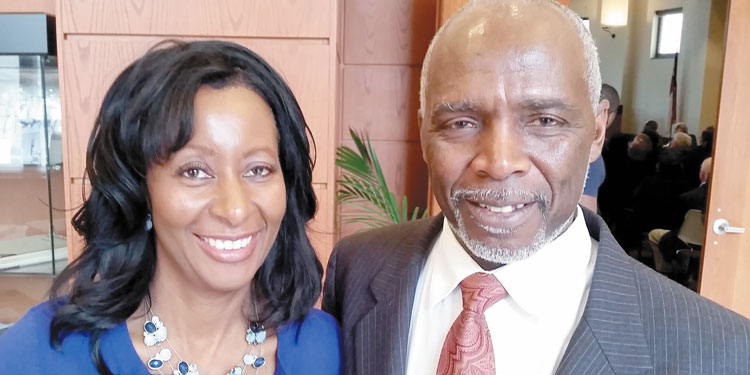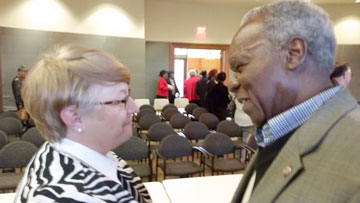By Dave Yochum. Because the 2015 Black History Month Celebration at Cornelius Town Hall honored the Rivens and Potts families, it was like a family reunion for more than 100 people, most of them born and raised in Smithville.
Mindful of a key voting block, would-be politicians attended too.
Indeed, the Rivens’ and the Potts’ are part of the fabric of old Cornelius. Members of both families operated barber shops that cut hair for black and white men alike.
“It was a true community back then, one where they say it takes a village to raise a child, where everybody participated. There were a lot of children in the community. We always played outside. We could go anywhere in the community and anybody could be our parent,” says Ron Potts, whose brother Mickey runs Potts Barber Shop now.
“It was a wonderful place to grow up.” Their father, Wilson Potts, was the patriarch of the family, and one of the elders of Smithville. He was respected by black and white alike in what was still largely a mill town, having been transformed by the textile industry starting around 1905. Black families mostly lived in Smithville just east of Highway 21 along Catawba Avenue.
While there was plenty of turmoil in other cities and communities during the 1960s, Cornelius avoided all that. Residents today credit level-headed and big-hearted people, black and white, in Cornelius.
Before 1972, black barber shops like Wilson Potts’ cut white men’s hair only. They didn’t cut hair for both black men and white men. It was an unwritten rule.
Well-meaning Davidson College students weren’t quite ready for the subtleties around black barbers and white customers around 1968 up in Davidson. The late Ralph Johnson, a black barber who later attended Community in Christ Lutheran Church in Cornelius, found himself in the middle of subtle and unspoken segregation. In his autobiography, “David Played a Harp,” Johnson wrote about how he lost his business when Davidson College students picketed for not cutting blacks’ hair.
In 1942 Rutt Norton started barbering on Brick Row in old downtown Cornelius, but the customers were white only. The Potts boys shined shoes back when people dressed sharp on Saturday night.
You could always get your shoes shined by the Potts boys; the Stinson boys, Barry, Wilson and Ronnie; and the Forney boys, Wilbert and Gilbert or Peewee.
Wilson Potts bought the barber shop in 1957. Of course the customers were all white and the barbers were all black.
Wilson was one of the people who brought water to Smithville when it was literally on the outskirts of Cornelius. They had kerosene lights before World War II and no running water. The men dug trenches around the Smithville community on their days off and water pipes were laid in.
Flash forward to the turmoil of the 1960s, the Martin Luther King assassination and the Swann vs. Charlotte Mecklenburg Schools decision in 1971. The New South still resembled the Old South in some ways.
But in 1972 a black man named Toot Burton walked into Potts Barber Shop. “Wilson told him to sit down,” Ron Potts says.
And that was the end of segregation.
Among the people attending the Black History Month event at Town Hall was Mickey and Ron’s brother, Dr. James Potts, a well-known cardiologist from Nashville, Tenn. He completed his training at the University of Pennsylvania; he was a practitioner and professor of medicine at Upstate Medical Center in Syracuse, N.Y.
“It just shows you what a little hardscrabble community can produce,” James said. He is on the faculty at Meharry Medical School in Nashville.
Their father Wilson had a big rule: “If you didn’t go to church on Sunday, you couldn’t go out on the following Saturday night.”
Mayor Pro Tem Woody Washam, who grew up in Cornelius, addressed the crowd too.
Addressing old friends, he said: “If it weren’t known in that barber shop it didn’t happen. Potts Barber Shop…a majority of decisions that were made in this town started in Potts Barber Shop.”
Discussing both the Rivens and the Potts barber shops, he said, “These truly unique establishments have set the foundation for this town.”
The leadership that came out of Cornelius’ old-time barber shops was formidable. Washam pointed out that Wilson’s daughter-in-law Nannie Potts became mayor of Cornelius.
Tonya is among the most well-known members of the Rivens family: She is the on-air traffic personality on WBT-TV and Power 98 Radio.
“Cornelius was close-knit and caring…that’s why integration was able to happen. One of the jewels of this community was that integration was not an issue, Tonya said. “We have a special community here.”
Her brother, Martin Rivens, was one of the kids who integrated Cornelius Elementary in 1964. “One of the things that was always emphasized in our family was getting an education,” he said, standing not far from one of the original Rivens barber shop chairs.
“Everyone really loved my grandfather, so that made integrating easy. We didn’t have any problems, although it was a real difficult time. Everything turned out really well, I still have friendships to this day,” said Martin Rivens, whose passion was baseball. The Davidson Jets were the local team.
Martin went on to land a scholarship to Gardner-Webb University.
“The whole weekend in Cornelius was about baseball,” he said.






